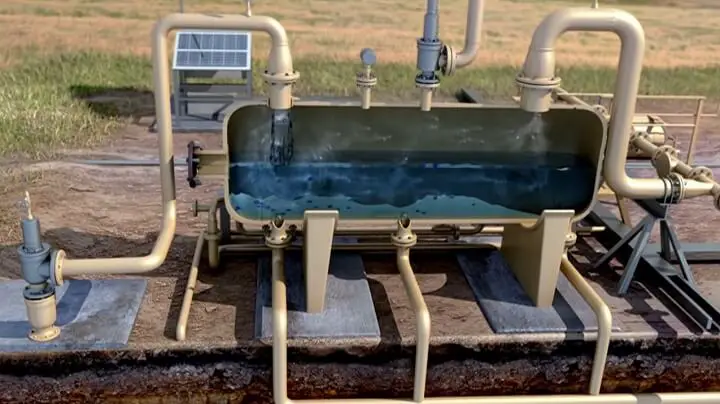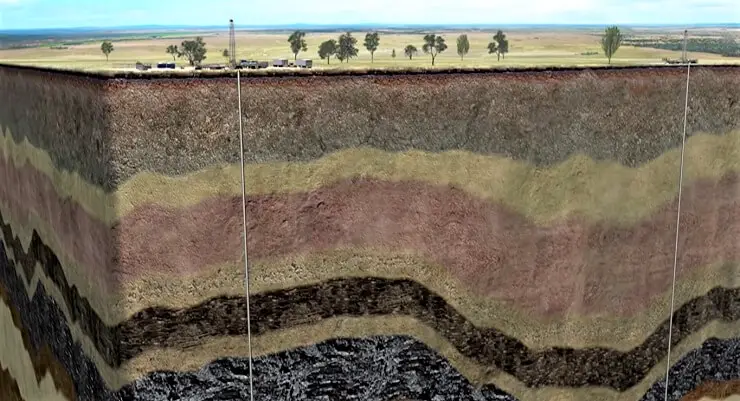Disclosure: As an Amazon Associate, I earn from qualifying purchases. Learn more
Last Updated on September 15, 2022 by Mark Jase
As the world progresses, we are finding new and improved ways to power our homes and businesses. We are also becoming more aware of the environmental impact of the choices we make. So, when will we stop using natural gas?
Natural gas is a fossil fuel, which means it is non-renewable. This means that once we use it up, it’s gone forever. It is also a greenhouse gas, meaning it contributes to climate change.
There are many reasons why we need to stop using natural gas, but there are also some challenges in doing so. One challenge is that natural gas is currently cheaper than renewable energy sources like solar and wind power. This means that people are more likely to choose natural gas over cleaner options, even if they are aware of the environmental impacts.
Another challenge is that natural gas infrastructure is already in place in many parts of the world. This means that switching to renewable energy sources would be very expensive and disruptive. Despite these challenges, there are many reasons why we need to stop using natural gas.
The most important reason is that it is a finite resource that we are quickly running out of. Additionally, its contribution to climate change cannot be ignored.
There’s no doubt that natural gas is a major part of our lives. It’s used to heat our homes, power our businesses and provide energy for many industrial processes. But with the rise of renewable energy sources like solar and wind power, some experts are predicting that natural gas will eventually be phased out.
So when will this happen? It’s hard to say for sure, but it could be sooner than you think. A recent report from the International Renewable Energy Agency (IRENA) found that renewables could make up almost 80% of the world’s energy mix by 2050.
If this happens, it would mean a huge increase in solar, wind, and other forms of renewable energy – and a corresponding decrease in the use of natural gas. Of course, there are still many factors that could affect this transition away from natural gas. The cost of renewables needs to continue to fall, and the infrastructure for them needs to be built out on a much larger scale.
But if all goes according to plan, we could see a major shift away from natural gas in just a few decades’ time.

Why are We Using Natural Gas?
Natural gas is often thought of as a “cleaner” fossil fuel, but what exactly does that mean? Natural gas is composed mostly of methane, which is a greenhouse gas. Greenhouse gases trap heat in the atmosphere and contribute to climate change.
So how can natural gas be considered clean? Well, when burned for energy, natural gas produces lower levels of carbon dioxide than other fossil fuels like coal and oil. It also emits less sulfur dioxide and nitrogen oxides, which are pollutants that can cause respiratory problems.
Additionally, using natural gas instead of other fossil fuels can help reduce our dependence on imported oil. So while natural gas isn’t perfect, it is cleaner than other options and has the potential to help us transition to a more sustainable energy future.
Relevant: Can You Store Natural Gas in a Tank? How?
When Will We Stop Using Natural Gas?
Most experts agree that we will need to stop using natural gas long before it runs out. The reason is simple – burning natural gas releases greenhouse gases into the atmosphere, contributing to climate change. There is no easy answer as to when we will need to stop using natural gas.
It depends on a number of factors, including the rate at which we can develop renewable energy sources and how quickly we can phase out fossil fuels altogether. Some estimates suggest that we may need to stop using natural gas as early as 2030 in order to meet our climate goals. In the meantime, there are things we can do to reduce our reliance on natural gas.
We can improve energy efficiency and invest in renewable energy sources like solar and wind power. We can also switch from natural gas-fired furnaces and boilers to electric ones. Making these changes will require a concerted effort from individuals, businesses, and governments alike.
But if we don’t act now, the consequences could be catastrophic for our planet.
What are the Alternatives to Natural Gas?
Natural gas is a fossil fuel that is used to generate electricity and heat. It is a non-renewable resource, meaning it cannot be replenished once it has been used. The use of natural gas releases greenhouse gases into the atmosphere, which contributes to climate change.
There are several alternatives to natural gas that can be used to generate electricity and heat, including renewable energy sources such as solar, wind, and hydropower. These alternative energy sources are environmentally friendly and do not release greenhouse gases into the atmosphere.
How Long Will Natural Gas Last?
Natural gas is a fossil fuel that is formed from the remains of dead plants and animals. It is a non-renewable resource, which means that it cannot be replenished once it is used up. The United States has the largest reserves of natural gas in the world, followed by Russia and Iran.
According to the U.S. Energy Information Administration (EIA), there are enough reserves to last for more than 100 years at current consumption levels. That said, natural gas production in the U.S. is already beginning to decline as existing wells are depleted and new ones are not being drilled fast enough to replace them. This will eventually lead to higher prices and increased imports from other countries with their own dwindling supplies.
So while there may be enough natural gas to last for many decades, its days as an affordable and plentiful energy source are numbered.

What Impact Does Natural Gas Have on the Environment?
Natural gas is a fossil fuel that, when burned, releases carbon dioxide and other pollutants into the atmosphere. These emissions contribute to climate change and have negative impacts on public health. Burning natural gas also emits nitrogen oxides, which are a precursor to ground-level ozone – a pollutant that can cause respiratory problems.
Additionally, methane, another component of natural gas, is a potent greenhouse gas that contributes to climate change. While natural gas may be less polluting than other fossil fuels like coal and oil, its extraction and production can also have harmful impacts on the environment. For example, hydraulic fracturing (or “fracking”), a process used to extract natural gas from underground shale formations, can contaminate water supplies and release methane into the atmosphere.
Overall, natural gas development creates environmental risks and harms public health. When making decisions about energy sources, it’s important to consider all of these impacts – not just how much carbon dioxide is released when the fuel is burned.
Read More: Can a Diesel Engine Run on Propane?
List of Cities Banning Natural Gas
There’s a growing movement to ban natural gas in new buildings. Cities across the U.S. are adopting policies that prohibit or severely restrict the use of gas in new construction, and many more are considering similar measures. The rationale for these bans is simple: burning natural gas releases greenhouse gases into the atmosphere, contributing to climate change.
These bans are having a real impact. In 2019, California became the first state to require that all new homes be “zero net energy” by 2020, meaning they produce as much energy as they consume over the course of a year. This will likely mean an end to gas-powered appliances in new homes statewide.
And other states are following suit; Massachusetts has set a goal of making all new buildings zero net energy by 2030, and New York has committed to reducing greenhouse gas emissions by 80% by 2050 (compared to 1990 levels).
The list of cities banning natural gas is growing, too. Berkeley, CA was one of the first cities to adopt a total ban on natural gas in new construction, and others have since followed suit, including San Francisco, CA; Boulder, CO; Atlanta, GA; Honolulu, HI; Somerville, MA; Minneapolis MN; Portland OR; and Seattle WA.
Gas to Be Phased Out by 2030
The world is slowly but surely shifting away from fossil fuels and towards renewable energy sources. This process is happening in fits and starts, with some countries leading the way while others lag behind. One major step forward was taken recently when the UK government announced that it plans to phase out gas by 2030.
This is a huge deal, as gas currently accounts for around 60% of the country’s energy usage. The plan is to replace gas with electricity, which will be generated by renewables such as wind and solar. This is a massive undertaking, but it’s one that the UK is confident it can achieve.
There are many reasons why this switch is being made. Firstly, burning gas releases harmful emissions into the atmosphere, contributing to climate change. Secondly, electric power is becoming increasingly cheaper as technology improves and more renewable energy sources come online.
Finally, phasing out gas will increase the UK’s energy security, as currently most of its gas comes from imports. The UK isn’t the only country looking to make this shift – France has also announced plans to stop using natural gas by 2023. It’s clear that the future of energy lies in renewables, and it’s encouraging to see governments taking steps to make this happen sooner rather than later.
End of Natural Gas
As the world’s population continues to grow, the demand for energy increases. However, the supply of fossil fuels is finite and will eventually run out. The end of natural gas is an inevitable event that will have a major impact on our society.
Natural gas is used for a variety of purposes, including heating homes and powering industry. It is also a key ingredient in the production of fertilizers and plastics. In addition, natural gas is used to generate electricity.
When natural gas supplies start to dwindle, these industries will be forced to find alternative sources of energy. The impact of the end of natural gas will be felt across the globe. Countries that rely heavily on imported natural gas will be especially hard hit.
For example, Japan imports nearly 80% of its natural gas from other countries. As supplies dwindle, prices are likely to increase dramatically, causing economic hardship for consumers and businesses alike. In addition to the economic impacts, the end of natural gas will also have environmental consequences.
Natural gas is a relatively clean-burning fossil fuel, so its demise will lead to an increase in emissions of greenhouse gases like carbon dioxide and methane.

Summary
The use of natural gas has been on the rise in recent years as a cleaner and more efficient alternative to other fossil fuels. However, there is growing concern over the environmental impact of natural gas extraction and production. A new study by the University of California, Berkeley, finds that natural gas may not be as clean as we thought.
The study found that methane emissions from natural gas production are up to 30% higher than previously estimated. Methane is a powerful greenhouse gas that contributes to climate change. The study says that these higher methane emissions could negate the climate benefits of switching from coal to natural gas.
This study highlights the need for more research on the impacts of natural gas development. It also underscores the importance of reducing methane emissions from all sources, including agriculture and waste management.
Featured image credit: www.youtube.com